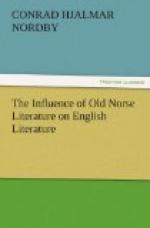things.
But the smile is departed from him, and the laugh of Sigurd the
young,
And of few words now is he waxen, and his songs are seldom sung.
Howbeit of all the sad-faced was Sigurd loved the best;
And men say: Is the king’s heart mighty beyond all hope of rest?
Lo, how he beareth the people! how heavy their woes are grown!
So oft were a God mid the Goth-folk, if he dwelt in the world alone.
(P. 205.)
Set this by the side of the saga: “This is truer,” says Sigurd, “that I loved thee better than myself, though I fell into the wiles from whence our lives may not escape; for whenso my own heart and mind availed me, then I sorrowed sore that thou wert not my wife; but as I might I put my trouble from me, for in a king’s dwelling was I; and withal and in spite of all I was well content that we were all together. Well may it be, that that shall come to pass which is foretold; neither shall I fear the fulfilment thereof.” (Voelunga Saga, Chap. XXIX.) These words are spoken to Brynhild after she has discovered what she regards as Sigurd’s treachery. His words are dictated by a noble resignation to fate, but his very next remark shows a moral meanness not at all in keeping with Morris’s conception. Sigurd said: “This my heart would, that thou and I should go into one bed together; even so wouldst thou be my wife.”
There have been many griefs depicted in this poem, but surely here are set forth the most pitiless of them all. The guile-won Brynhild travels in state to the Cloudy Hall of the Niblungs, and the whole people come out to meet her. They are astonished at her beauty, and give her cordial greeting and welcome to her husband’s house. Proud and majestic, the marvelous woman steps from her golden wain, and gives friendly but passionless greeting to Gunnar as she places her hand in his. For each of Gunnar’s brothers she has a kindly word, as she has for Grimhild, too. She asks to see the foster-brother of whom such wondrous tales are told, and whose name she heard from Gunnar’s lips with never a tremor—“Sigurd, the Volsung, the best man ever born.” Grimhild stands between them for a time, but the meeting has to come. Then Brynhild remembers, and Sigurd sees the unveiled past:
Her heart ran back through
the years, and yet her lips did move
With the words she spake on
Hindfell, when they plighted troth of love.
. . . . . . . . . . . . . .
His face is exceeding glorious
and awful to behold;
For of all his sorrow he knoweth and his hope
smit dead and cold:
. . . . . . . . . . . . . .
For the will of the Norns is accomplished,
and outworn is Grimhild’s
spell
And nought now shall blind or help him, and the
tale shall be to tell.
(P. 226.)




